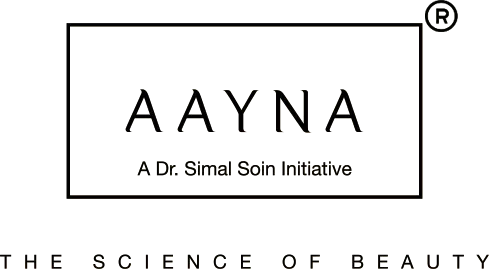Are you struggling with those pesky breakouts? Are you looking to get clearer healthier skin? Learning how to stop acne is important, but getting expert help can make a big difference. AAYNA offers personalized treatments that match your skin’s needs. Let AAYNA be the best thing that ever happened to your skin.
Everybody who has had acne for a long time understands how difficult it becomes to repair your skin. To interrupt the seemingly never-ending circle of breakouts, you may take all possible actions to stop more pimples from appearing in addition to trying to treat the existing ones but it never stops.
Having acne may make it seem like outbreaks never stop, irrespective of how hard you try. Although there may not be a foolproof method to permanently cure acne, we can lessen outbreaks and maintain healthy skin. Given here are 8 useful techniques to reduce pimples. However, The first step towards getting healthy skin is understanding the condition of acne and how we get pimples so that we can take the appropriate actions.
What Is Acne?
Excess production of oil in our skin leads to the condition we all know as acne. The pores on our skin get clogged, allowing bacteria to grow in excess. This is what causes breakouts like whiteheads, blackheads, and pimples.
Although acne usually affects the face, it can also affect other areas of the body like the neck, back, or scalp. Since every person’s acne is unique, it’s critical to determine your acne type to treat it correctly.
Why Do Breakouts Occur?
Acne is caused by a multitude of conditions. Breakouts can be brought on by hormonal issues, stress, wearing too much makeup, and some unhealthy behaviors including smoking.
The way you eat might also affect how the skin responds. t how your skin behaves. For instance, it is suggested that fried meals, some dairy products, as well as, processed foods with high sugar and fat content can exacerbate the condition.
Additionally, some people may have acne-prone skin due to their genetic component which sadly cannot be done much about.
Though it might require some effort, figuring out what causes the pimples can be beneficial in the end. Start maintaining a notebook about your meals, if you experience any stress along with other choices or habits which may cause acne.
Since we have established a basic understanding of acne, let us now see how we can reduce them.
Related Blog: Exclusive Acne Treatment Skin Regime for Indian Skin
8 Tips to Reduce Pimples
Wash your face properly
Although they can develop elsewhere on our skin, pimples most frequently affect our face. Even though the microbial surface of our skin is complicated, some bacteria may still lead to outbreaks of acne. This bacterium converts sebum, the natural oil on our skin, into fat which causes irritation.
Daily perspiration, debris, and oil removal can help avoid breakouts; however, excessive face cleaning might exacerbate acne.
Excessive cleaning deprives the skin of sebum, and our skin consequently creates extra oil to restore balance. So, overwashing your face and using harsh cleansers can further worsen your acne by drying the skin.
You should generally wash your face not more than 2 times a day. Try to use a face wash that is mild and free of harsh chemicals or fragrances. Avoid using foamy soaps or abrasive scrubs altogether. Use warm water to wash your face and avoid rubbing it too much. Rather, gently get the dirt without damaging the protective layer of the skin.
Recognize your Skin Tone
Understanding which products are good for your skin depends on the type of your skin. hat products to use and what not to use depends on your skin type. If uncertain, use the given criteria to determine the skin type or consult dermatology experts at AAYNA.
You can use the following parameters to identify your skin type, but you can also consult a dermatologist for help if you’re still unsure:
Oily– The skin seems glossy by the end of the day.
Dry – The skin appears taut and flaky
Combination – The forehead, nose, and chin remain oily, whereas the rest of the face feels dry.
Sensitive – The skin quickly bursts out in rashes and inflammation with products.
Although pimples may impact everyone, those with oily skin types are often more likely to have acne. It might be simpler to select an acne treatment plan that gets rid of acne routine to get healthier skin.
Too many products containing active chemicals, such as retinol creams, exfoliating toners, and washes with salicylic acid, might harm your skin’s protective layer and exacerbate outbreaks if you have sensitive, acne-prone skin. Using a moisturizer designed for dry skin might be excessively occlusive and cause blocked pores if you have oily skin.
Related Blogs: How Effective is Derma Pen for Acne Scars?
Apply a Moisturizer
Moisturizing helps skin stay hydrated, which is very beneficial for skin that is prone to acne. Your skin will generate oil, or sebum, to balance out any dryness if it becomes very dry. Moreover, as was already said, acne can result from too much sebum.
Nevertheless, a lot of moisturizers have chemicals that might bother the skin and result in pimples, such as oil or artificial smell. When buying a moisturizer, be sure to look at the ingredient list to ensure that it is noncomedogenic and devoid of scent.
Minimize Cosmetics
Although you might be inclined to conceal up zits with cosmetics, be aware that doing this might lead to breakouts and clogged pores. If you can’t bear to give up makeup entirely, use hypoallergenic, fragrance-free foundations or makeup to keep your skin from getting any worse.
Carefully remove all makeup with gentle cleansers by nightfall, particularly before sleeping. One effective combination of acne treatment and concealing may be achieved by using salicylic acid-containing tinted moisturizer.
It also works well to be cautious about any additional items that we use or keep near our face, especially hair styling equipment. Products like dry shampoo, hair styling gels, and sprays directly touch our skin, they can irritate the skin and cause pimples. Consider alternatives that are organic, oil-free, and hypoallergenic, instead.
Related Blogs: Dermapen Microneedling Treatment for Acne
Maintain your Hydration
Our body sends a signal to the oil glands in our skin to create extra oil whenever we may be dehydrated. In addition to making your skin seem lifeless, dehydration further encourages irritation and discoloration.
Make sure you consume 8 tall glasses or more of water every day to ward off dehydration.
Increase your drinking:
Following a workout
If breastfeeding or expecting
While residing in a warm, muggy climate
Avoid touching your face
You may get germs and other contaminants that clog pores on the skin if you touch your face.
Although it might be difficult to refrain from touching your face, make an effort to monitor how frequently you do so and attempt to interrupt yourself as many times as you can.
Additionally beneficial? frequent hand washing. In this manner, your hands will be clean if you are touching your face, which, let’s face it, you most likely will.
Related Blog: Illuminate Your Confidence: Erase Acne Scars with Fraxel Laser
Minimize your Sun Exposure
While exposure to sunlight might temporarily reduce pimples, it may have long-term negative effects on our skin. s on the skin. Regular exposure to the sun causes our skin to lose its moisture which eventually leads to increased oil production and pore blockage.
Throughout the year, using sunscreen may help keep your skin safe. Naturally, as you may already be aware, sunscreens typically have an oily consistency. Choose a sunscreen that is oil-free and n anti-pore clogging, to defend against pimples and the sun.
Steer Clear of Certain Foods
Another possible cause of acne is your diet.
The following are a few typical offenders that lead to skin issues like acne:
Processed Meals
Dairy Goods
Alcohol
Refined Sugars
Your outbreaks may subside if you cut back on these foods or switch to an anti-acne diet. You can attempt an exclusion diet to more precisely determine the reason for your acne flare-ups if reduction doesn’t appear to be helping.
An elimination diet typically entails a 23-day fast food fast, dairy, egg, soy, and alcohol fast. While it could sound a bit drastic, you might begin reintroducing these items back into your regular diet one by one, after 23 days, to identify any changes that may happen in your skin. You may use this to determine which meals personally cause your skin to break out.
It is advisable to see a nutritionist before starting any new diet to ensure that you still get the proper calorific count along with complete nutrition as needed by your body.
Related Blog: Acne Causes and Treatments: A Beginner’s Guide
Conclusion
The majority of individuals occasionally have pimples. While these don’t always work, preventative measures might be beneficial. Nevertheless, there are several alternatives available to you for controlling and treating pimples. Remember that persistence and patience are essential for improving whichever acne preventive strategy you decide upon.
While understanding how to lessen pimples is a fantastic place to begin, using these practical tips in conjunction with expert dermatological treatments may greatly improve outcomes. In addition to our workable suggestions, AAYNA’s specialized and professional remedies provide a comprehensive strategy to assist you in getting cleaner, happier skin more quickly and efficiently.



